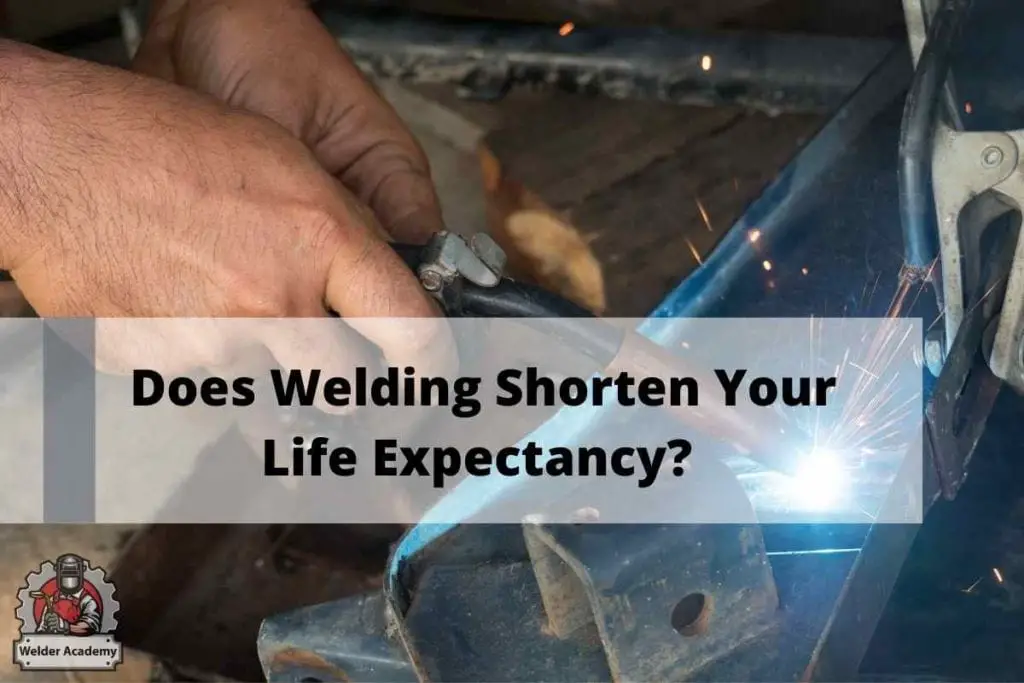Welding as a career is one of the most challenging jobs in the universe. As a welder has to embrace all the risks and health effects of welding throughout his career, the job is not for everyone. So, you might be thinking, does welding shorten your life expectancy?
To be fair, yes, welding does shorten your longevity. On average, a welder can have a life expectancy of about 40 to 50 years, given the severe risks and health hazards of welding.

So, if you are thinking of choosing welding as your career choice, you must be well aware of all the ins and outs of welding. You need to know about the life expectancy of welders, the health hazards of welding, and the safety measures to avoid getting sick! Therefore, please read the entire article to get a brief overview of all these facts!
How Long Do Welders Live?
Welders have one of the riskiest professions in the world! With all the visible and potential health effects, a welder lives about 40 to 50 years on average. This is much less than the average longevity of any normal healthy person.
Basically, welding is not as simple as it looks or sounds. So, what is welding? It is the process of applying heat on some metallic surface to melt it. This process liberates several toxic fumes and chemicals, as well as heat, flames, etc. All these are not good for your health.
Moreover, the fumes and the chemicals produced during welding can affect all your body systems. It can cause many deadly diseases, including cancer! Also, workers become more prone to injuries. There’s a risk of being suddenly and accidentally killed as well!
Welders have really high remuneration. In particular, pipe welders allegedly make more than $60,000 per year. You might think this is overbearing. But the welder has accepted his profession, knowing all the risks and benefits and even a shorter life expectancy! Underwater welding is an even riskier job, and the life expectancy is much lower too!
On average, a normal, healthy person lives about 72 years. That is the global life expectancy. On the other hand, the average life span is about 78 years in a country like the US. Living 50 years is really unfair compared to this. Welders choose their profession knowing this. In fact, many high schoolers won’t choose welding as a career because the stakes are too high!
How often do you hear a person saying they want to become a welder when they grow up? Very few, right? Thus, most choose the job for the money.
However, if you love the job, then it’s entirely your call to make! But risking your life for all that money is simply gambling. If you want to have a better life expectancy and live longer, take your own precautionary measures!
Why Is Welding Bad For Your Health?
The job of welding is itself considered a hazard. Anyone who lives in the close vicinity of a welding shop is also at risk. The toxic fumes, when inhaled, can cause serious damage to your health.
Actually, the dangers of welding are associated with the poisonous gases it liberates, the flash burns, shocks, and electrocutions, and the deafening noise it produces. It can cause many deadly diseases that may even lead to death! Below, I have explained the harmful health effects of welding. Keep reading to find out in detail!
Short-term Effects
Let’s start with the short-term effects of welding. The most negligible health effects are nausea, dizziness, dyspnoea (or shortness of breath), cough, irritation of skin, eyes, nose, etc.
It can lead to bronchitis, pneumonia, or even encephalopathy! However, these effects do not last long. Drinking milk often helps to get rid of the short-term effects of welding.
Cancers
The most dangerous health hazard is that welding can cause cancer. A wise man once said that there is no other job as hazardous as welding! The welding fumes are so toxic and carcinogenic that they have been compared to smoking. Most importantly, the heavy elements like chromium, nickel, etc., in these fumes are directly linked to cancer.
Basically, these metals can penetrate the lining epithelium of the alveoli. Alveoli are the smallest functional units of our lungs. These are some air sacs that help in the gaseous exchange during our respiration. They are constantly breathing air in and out. Each lung has thousands of alveoli.
When toxic chemicals penetrate the alveoli, they can alter the genetics of these cells. It is a kind of metaplastic change. It is the leading cause of lung cancer in welders.
COPD
COPD, or Chronic Obstructive Pulmonary Disease, is a long-term ailment of old age. It is particularly common in smokers. Primarily, it is seen in people who have smoked their whole lives!
As the fumes from welding are equally dangerous, COPD has become a common disease for welders too. Wear protective gear to avoid inhaling these fumes.
Electrocutions
Electric shocks and getting electrocuted are very common among welders. In particular, welding should not be done on wet surfaces or in adverse climatic conditions. Basically, it is best to avoid welding when it rains.
There are many reports of people dying from shocks from welding. When a huge voltage attacks you in a single encounter, it may lead to heart attacks, fibrillation, cardiac arrest, and even death.
Deafness
It is not a hazard that can decrease your lifespan. But it surely reduces the quality of life. The constant noise from welding can often be deafening and lead to a conductive type of deafness.
Actually, long-term exposure to bad sounds can make you deaf in old age. It reduces your threshold of hearing and damages your hearing cells.
Flash Burns
The flashes and waves produced by welding can burn your skin, eyes, mucous membranes, and nasal epithelium. Welding produces a large amount of heat, and this can burn your exposed body surfaces.
The most dangerous thing is that it causes flash eye burns. Welding can lead to arc eyes, which is a kind of eye disease. If you are experiencing redness and a burning sensation in your eyes following welding, consult a physician as soon as possible. You must wear personal protective equipment to protect yourself from burns.
Metal Fume Fever
Chronic exposure to the fumes of welding can cause metal fume fever. Gases like carbon monoxide, carbon dioxide, fluorine, nitrogen oxides, etc. are the most notorious gases. But the gases linked with this fever are produced by the welding of galvanized steel.
These gases are, for instance, oxides of zinc, selenium, cadmium, cobalt, nickel, aluminum oxide, magnesium oxide, arsenic, etc.
Metal fume fever usually appears on the weekends and gets better with the start of the following week. The symptoms are typically flu-like, and the treatment is mainly symptomatic.
Neurological Disorders
Welding has been linked directly with Parkinson’s disease and parkinsonism. It is a kind of neurological disease characterized by slowness of movement, rigidity, tremors, stooping posture, etc.
It is a disease of old age. Mainly, it occurs due to exposure to nickel and chromium. This may not cause death. But it becomes a burden to live with. Parkinson’s can be cured with proper treatment.
Injuries
Welders are prone to injuries at any time. You can experience injuries from objects falling on your head or any other body part. Also, severe cuts and head injuries are widespread.
Accidents can occur at any instant. And worse, accidental deaths do not come announced. So, as a welder, you need to be very careful about tackling accidents!
Welding Safety Measures To Protect Your Health
Now, you must take some precautions to protect yourself from the apparent dangers of welding. Your safety is your responsibility!
Most importantly, OSHA has devised some health and safety measures for welders. You must follow these strictly to avoid getting sick or premature death. The effects of welding may not show instant effects. But it will make you suffer in the long run. So, always follow these safety tips:
- Do the welding work in an open area. [check our article: Can You Weld Outside?]
- Avoid working in closed rooms with bad ventilation. The room must have proper arrangements to let the toxic fumes blow away.
- Clean the welding surfaces constantly so that the poisonous metals don’t get settled.
- Wear respirators and protective masks.
- Use personal protective equipment. Use caps, gloves, protective shields, gowns, goggles, etc.
- Keep an exhaust system if you can.
- Avoid all sorts of means by which you can inhale the fumes.
- Use protective boots and insulators when welding on wet surfaces.
Conclusion
Welding work is not a child’s play, and the health hazards are too high compared to the benefits. If you choose welding as a career option, you must accept all the pros and cons. So, if anyone asks you now, does welding shorten your life expectancy? You know what to advise them!
I hope this article helped you learn in detail about welding hazards and their effect on longevity. Thank you for reading the entire article with patience. Stay safe and healthy. Have a nice day!
